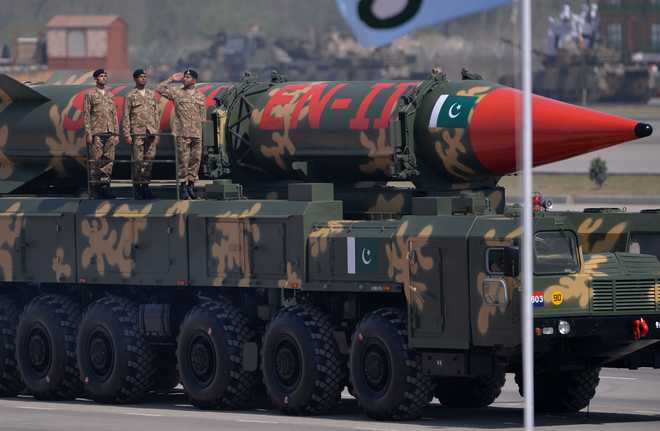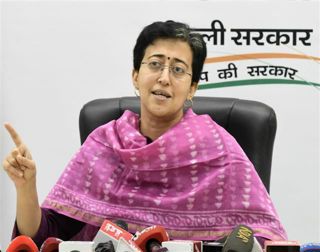
Pakistani military personnel stand beside the long-range ballistic Shaheen-II missile during the Pakistan Day military parade in Islamabad on March 23, 2015. — AFP file photo
Islamabad/Washington, October 21
Pakistani Prime Minister Nawaz Sharif will tell US President Barack Obama this week that Islamabad will not accept limits on its use of small tactical nuclear weapons, Pakistani officials said on Wednesday.
Pakistan insists smaller weapons would deter a sudden attack by its bigger neighbour India, which is also a nuclear power.
But the United States worries tactical weapons may further destabilise an already volatile region because their smaller size makes them more tempting to use in a conventional war.
Sharif and Obama are due to meet at the White House on Thursday. The Obama administration is preparing to sell eight F-16 fighter jets to Pakistan in an attempt to bolster the two countries' relationship despite Washington's concerns about Pakistan's growing nuclear arsenal, according to a US source familiar with the matter.
The aircraft sales, which the US Congress could block, would be a symbolic step given Pakistan's already large fleet of fighter jets. The sales were first reported by the New York Times.
The United States wants Pakistan to commit to not using tactical nuclear weapons but Islamabad wants to keep its options open as a way of deterring a potential Indian attack, said Maria Sultan, head of the South Asian Strategic Stability Institute.
Pakistan says the United States is demanding unreasonable limits on its use of nuclear weapons and not offering much in return apart from a hazy promise to consider Pakistan as a recognised recipient of nuclear technology.
"Pakistan's nuclear programme is ... India-centric. And it exists to make war a non-option ... Tactical nuclear weapons block off this room (for war) completely," said a Pakistani security official with knowledge of the country's nuclear program. "No one can dictate what kind of weapons we will make or use."
Pakistan was working on developing a nuclear submarine, he added. "The goal is a sea-based second strike capability," he said, referring to a submarine that could carry nuclear warheads and strike in case land-based nuclear weapons were wiped out.
US Secretary of State John Kerry met Sharif on Wednesday but State Department spokesman John Kirby declined to say whether a US call for nuclear restraint was discussed.
Kirby told a regular news briefing Pakistan remained engaged with the international community on nuclear security and added: "We believe that they believe in the importance of nuclear security issues."
US urges Pakistan-India dialogue
Kirby also said the United States encouraged India and Pakistan to engage in direct dialogue to reduce tensions.
"The normalisation of relations between Pakistan and India is vital to both countries and to the region," he said, while adding Kerry and Sharif discussed the need for more efforts against militants in Pakistan.
Pakistan and India have fought three wars since becoming separate countries in 1947. Both claim the disputed Himalayan region of Kashmir. India frequently accuses Pakistan of supporting militants operating on Indian territory.
For the past two years, Pakistan has tested missiles that can reach all of India, and very short-range missiles that could be used if Indian troops cross onto Pakistani soil.
Pakistani Foreign Secretary Aizaz Chaudhry said on Tuesday this was a reaction to Indian threats to make a limited, lightning raid with conventional forces in case of militant attack, an idea known as the ‘Cold Start’ doctrine.
"In India, they brought the Cold Start doctrine," he said. "So we have also preserved our deterrence capability." Nonproliferation experts worry that Pakistan's tactical nuclear weapons increase the risk of nuclear conflict.
"The smaller they are, the more tempting it becomes to use them against a conventional force," said nuclear physics professor Pervez Hoodbhoy.
"The development and deployment of tactical nuclear weapons is a complete change of strategy. Earlier, nuclear weapons were instruments for deterring war, but now they're seen as weapons for actually fighting a war."
Maria Sultan, head of the South Asian Strategic Stability Institute, said Washington was demanding that Pakistan increase its threshold for launching a nuclear attack and crack down on anti-India militants.
But it did not offer Pakistan what it craved, she said — recognition as a legitimate supplier of nuclear technology. — Reuters


























